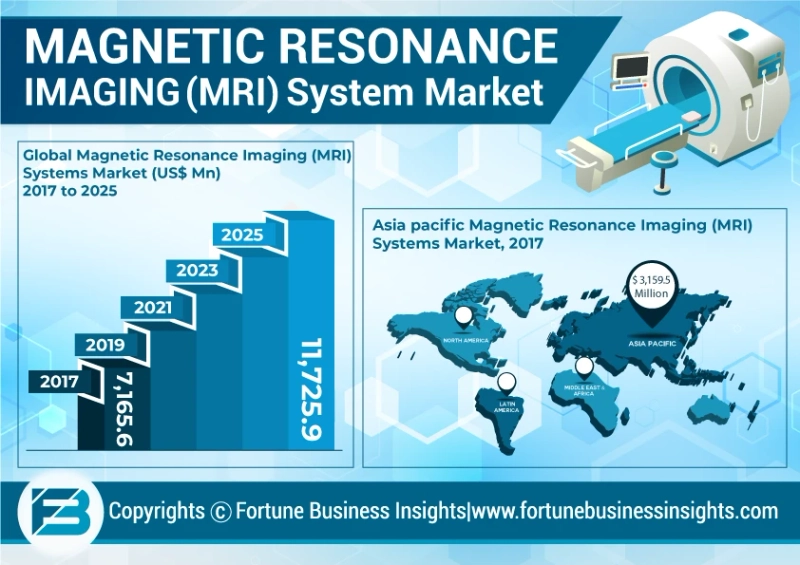The rising demand from musculoskeletal application segment is prognosticated to help the global magnetic resonance imaging equipment market rise at a positive pace, finds Fortune Business Insights in their new study. The study is titled, “Magnetic Resonance Imaging Equipment Market: Global Market Analysis, Insights and Forecasts, 2018 – 2025.” According to the study, the global magnetic resonance imaging equipment market, which stood at US$ 7,165.6 Mn in 2017, will reach US$ 11,725.9 Mn by the end of 2025. If these figures prove true, the global magnetic resonance imaging equipment market will rise at a CAGR of 6.4% between 2018 and 2025.
For more information in the analysis of this report, visit: https://www.fortunebusinessinsights.com/industry-reports/magnetic-resonance-imaging-mri-systems-market-100087
Key Players Operating in The MRI Equipment Market Include:
Key players are involved in mergers and acquisition to strengthen their market position. Owing to increasing competition frequent innovations are taking place in the market. Some of the companies operating the industry are:
- GE Healthcare
- Siemens Healthcare
- Koninklijke Philips N.V.
- Canon Inc.
- Hitachi, Ltd.
- Esaote SpA
- Shenzhen Anke High-tech Co., Ltd.
- Time Medical Holding
- SHENZHEN BASDA MEDICAL APPARATUS CO., LTD.
- Fonar Corporation
The musculoskeletal segment is anticipated to rise at a faster rate among other categories based on application. This is due to the recently proven clinical efficacy of MRI systems in detailed bone imaging cases. Again, the neurology segment, out of various applications will register a higher CAGR because of the expansion of neuroscience in developed nations and its application in medical therapies and testing devices. On the other hand, the hospital segment is likely to generate more revenue over the next few years, because of the significant rise in funding by governments.
Increasing Emphasis of Early Diagnosis to Boost MRI Equipment Market in Latin America
The increasing adoption of MRI systems for detection of severe internal injuries is propelling the MRI equipment market in Asia Pacific. This regional market also exhibits growth at a relatively higher pace. Besides, the increasing incidence of neurological and musculoskeletal disorders and rising number of patient pool will also bode well for the market. Government initiatives for installing new MRI machines in developing economies is likely to boost the market in Asia Pacific.
The adoption of new MRI techniques and the presence of majority of market players in North America will help the market to emerge at the fore. Meanwhile, the market in Latin America is likely to witness lucrative growth opportunities because of the increased adoption of MRI systems in the region. This, coupled with the rising emphasis of early diagnosis will help the market in Latin America contribute a significant share in overall market revenue.


